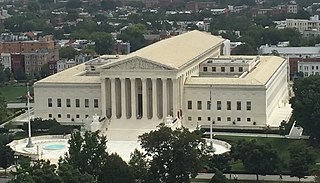
An appellate court, commonly called a court of appeal(s), appeal court, court of second instance or second instance court, is any court of law that is empowered to hear an appeal of a trial court or other lower tribunal. In much of the world, court systems are divided into at least three levels: the trial court, which initially hears cases and reviews evidence and testimony to determine the facts of the case; at least one intermediate appellate court; and a supreme court (or court of last resort) which primarily reviews the decisions of the intermediate courts, often on a discretionary basis. A particular court system's supreme court is its highest appellate court. Appellate courts nationwide can operate under varying rules.
In the United States, a state supreme court is the highest court in the state judiciary of a U.S. state. On matters of state law, the judgment of a state supreme court is considered final and binding in both state and federal courts.
In the United States, a state court has jurisdiction over disputes with some connection to a U.S. state. State courts handle the vast majority of civil and criminal cases in the United States; the United States federal courts are far smaller in terms of both personnel and caseload, and handle different types of cases. States often provide their trial courts with general jurisdiction and state trial courts regularly have concurrent jurisdiction with federal courts. Federal courts are courts of limited jurisdiction and their subject-matter jurisdiction arises only under federal law.

The United States courts of appeals are the intermediate appellate courts of the United States federal judiciary. They hear appeals of cases from the United States district courts and some U.S. administrative agencies, and their decisions can be appealed to the Supreme Court of the United States. The courts of appeals are divided into 13 "Circuits". Eleven of the circuits are numbered "First" through "Eleventh" and cover geographic areas of the United States and hear appeals from the U.S. district courts within their borders. The District of Columbia Circuit covers only Washington, DC. The Federal Circuit hears appeals from federal courts across the United States in cases involving certain specialized areas of law.
The Courts of England and Wales, supported administratively by His Majesty's Courts and Tribunals Service, are the civil and criminal courts responsible for the administration of justice in England and Wales.

A trial court or court of first instance is a court having original jurisdiction, in which trials take place. Appeals from the decisions of trial courts are usually heard by higher courts with the power of appellate review. Most appellate courts do not have the authority to hear testimony or take evidence, but instead rule solely on matters of law.

The Supreme Court of Maryland is the highest court of the U.S. state of Maryland. The court, which is composed of one chief justice and six associate justices, meets in the Robert C. Murphy Courts of Appeal Building in the state capital, Annapolis. The term of the Court begins the second Monday of September. The Court is unique among American courts in that the justices wear red robes.

The Supreme Court of Florida is the highest court in the U.S. state of Florida. It consists of seven justices—one of whom serves as Chief Justice. Six members are chosen from six districts around the state to foster geographic diversity, and one is selected at large.
The federal judiciary of the United States is one of the three branches of the federal government of the United States organized under the United States Constitution and laws of the federal government. The U.S. federal judiciary consists primarily of the U.S. Supreme Court, the U.S. Courts of Appeals, and the U.S. District Courts. It also includes a variety of other lesser federal tribunals.

The Supreme Court of Texas is the court of last resort for civil matters in the U.S. state of Texas. A different court, the Texas Court of Criminal Appeals, is the court of last resort in criminal matters.
The Judiciary of Vermont is the state court system of Vermont, charged with Vermont law.

The Judiciary of New York is the judicial branch of the Government of New York, comprising all the courts of the State of New York.

The Supreme Court of Mississippi is the highest court in the state of Mississippi. It was established in 1818 per the terms of the first constitution of the state and was known as the High Court of Errors and Appeals from 1832 to 1869. The court is an appellate court. The court consists of nine justices elected in nonpartisan contests from three districts to serve eight-year terms. The most senior justice serves as the chief justice. It is housed in the Carroll Gartin Justice Building in Jackson, Mississippi, the state capital.

The Supreme Court of the Republic of Albania is the highest court of Albania and is the final court of appeals in the country's judicial system. It is composed of seventeen judges: the Chief Justice and sixteen Members.
In law, an appeal is the process in which cases are reviewed by a higher authority, where parties request a formal change to an official decision. Appeals function both as a process for error correction as well as a process of clarifying and interpreting law. Although appellate courts have existed for thousands of years, common law countries did not incorporate an affirmative right to appeal into their jurisprudence until the 19th century.
The Judiciary of California or the Judicial Branch of California is defined under the California Constitution as holding the judicial power of the state of California which is vested in the Supreme Court, the Courts of Appeal and the Superior Courts. The judiciary has a hierarchical structure with the California Supreme Court at the top, California Courts of Appeal as the primary appellate courts, and the California Superior Courts as the primary trial courts.

The judiciary of Belgium is similar to the French judiciary. Belgium evolved from a unitary to a federal state, but its judicial system has not been adapted to a federal system.

The Judiciary of Louisiana is defined under the Constitution and law of Louisiana and is composed of the Louisiana Supreme Court, the Louisiana Circuit Courts of Appeal, the District Courts, the Justice of the Peace Courts, the Mayor's Courts, the City Courts, and the Parish Courts. The Chief Justice of the Louisiana Supreme Court is the chief administrator of the judiciary, and its administration is aided by the Judiciary Commission of Louisiana, the Louisiana Attorney Disciplinary Board, and the Judicial Council of the Supreme Court of Louisiana.
The judiciary of Illinois is the unified court system of Illinois primarily responsible for applying the Constitution and law of Illinois. It consists of the Supreme Court, the Appellate Court, and circuit courts. The Supreme Court oversees the administration of the court system.
The judiciary of Michigan is defined under the Michigan Constitution, law, and regulations as part of the Government of Michigan. The court system consists of the Michigan Supreme Court, the Michigan Court of Appeals as the intermediate appellate court, the circuit courts and district courts as the two primary trial courts, and several administrative courts and specialized courts. The Supreme Court administers all the courts. The Michigan Supreme Court consists of seven members who are elected on non-partisan ballots for staggered eight-year terms, while state appellate court judges are elected to terms of six years and vacancies are filled by an appointment by the governor, and circuit court and district court judges are elected to terms of six years.












